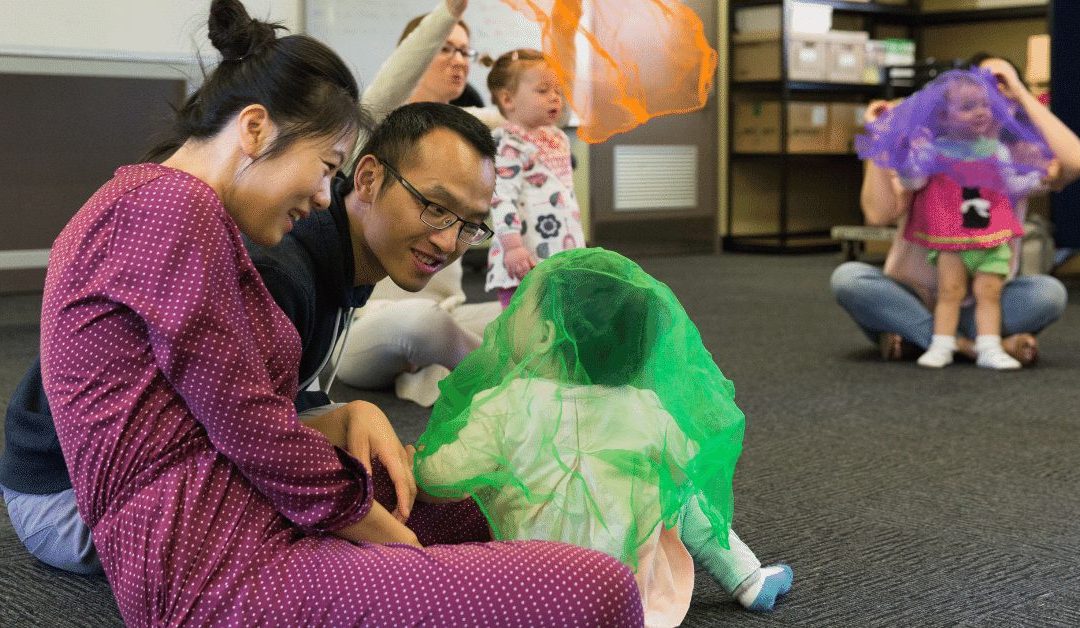I am often asked by the families of the children in our community and early education and childcare music classes how they can foster their children’s growing love for and skills in music. Here are three simple ways that this can be done:
1. Sing to and with your child often.
I talk in detail about the benefits of singing to babies in this article, but it really is beneficial to sing to and with our toddlers, preschoolers and older children as well. Making music together using the most accessible and available instrument that children have – their voices – is something that can be done anywhere, at any time. Our fundamental philosophy is that the voice should be the first and primary instrument used in early childhood music education. Every child has a voice, and they all know how to use their voice in some way or another. Physiologically, the only instrument children are ready to use in any meaningful way at this level is their voice. Singing helps children (and adults) to internalise the melodies and rhythms that make up music, so that the music can belong to them. There are many physiological and emotional benefits to singing as well, and a shared song is a particularly special experience.
2. Listen to live music together.
One of the absolute best things you can do for children is to immerse them in quality, age-approrpiate musical experiences
. If you can, take them to see as much live
music as possible. Part of being a lover of music is developing audience etiquette (which unfortunately some grownups lack!) By normalising going out and listening to musicians performing live, without any other distractions (such as screens/devices), we are helping our children to develop a love of the arts. Of course it is not reasonable to expect a child to sit quietly and still through an opera or a long concert, but there are many opportunities for them to see live music whilst still being able to move their bodies (which is vital for young children) and sing or talk. For Brisbane locals, the
Queensland Symphony Orchestra sometimes put on children’s concerts, and there are often family friendly bands at places like
Eat Street Northshore. A quick internet search should help you in finding free and ticketed musical events to take your child to.
3. Come to music classes.
A quality early childhood music class should be age-appropriate, based around live music making (not singing along with backing tracks) and should be delivered by qualified musicians and teachers who can provide an excellent, in-tune vocal model. Early childhood music classes should give children an opportunity to learn about and be immersed in
music, through play. Until about the age of five, the best way for children to learn is by playing. The musical games, action songs, lullabies, rhymes and dances that we use in
our classes are all designed to help children develop their understanding of
music and their musical skills in subconscious, or pre-conscious, ways. If you’re in Brisbane, or on the Gold or Sunshine Coast, you’re welcome to book classes for your
early education and childcare service. In the same way that we spend years reading to our children and immersing them in a variety of literature before expecting them to read and write, it is vital that children are immersed in music before consciously learning about or trying to write things such as notes and rhythms. I advise you to be wary of any companies that might purport to be able to provide formal
music learning (theory classes etc) for children under 5, and to thoroughly research their teachers before commencing (only the very best, most experienced and highly qualified teachers should be teaching the youngest children).
What about instrumental learning?
Whilst it is largely dependent on the individual child, private instrumental tuition is generally not appropriate until children are about five years old. Even if children have a propensity toward highly developed musical understanding at an earlier age, their levels of cognition and fine motor development don’t allow for proper instrumental tuition until then. The best instrument for young children to use is the one they are born with – their voice – which is why the majority of what we do in our classes involves live, unaccompanied singing. Singing to and with your children is exactly what is needed – both in the home and in music classes.
—
So in short, by taking your child to see lots of great (child appropriate) live music, singing and playing with them at home and coming along to some quality music classes, you can continue to foster their love of music and developing musical skills.

